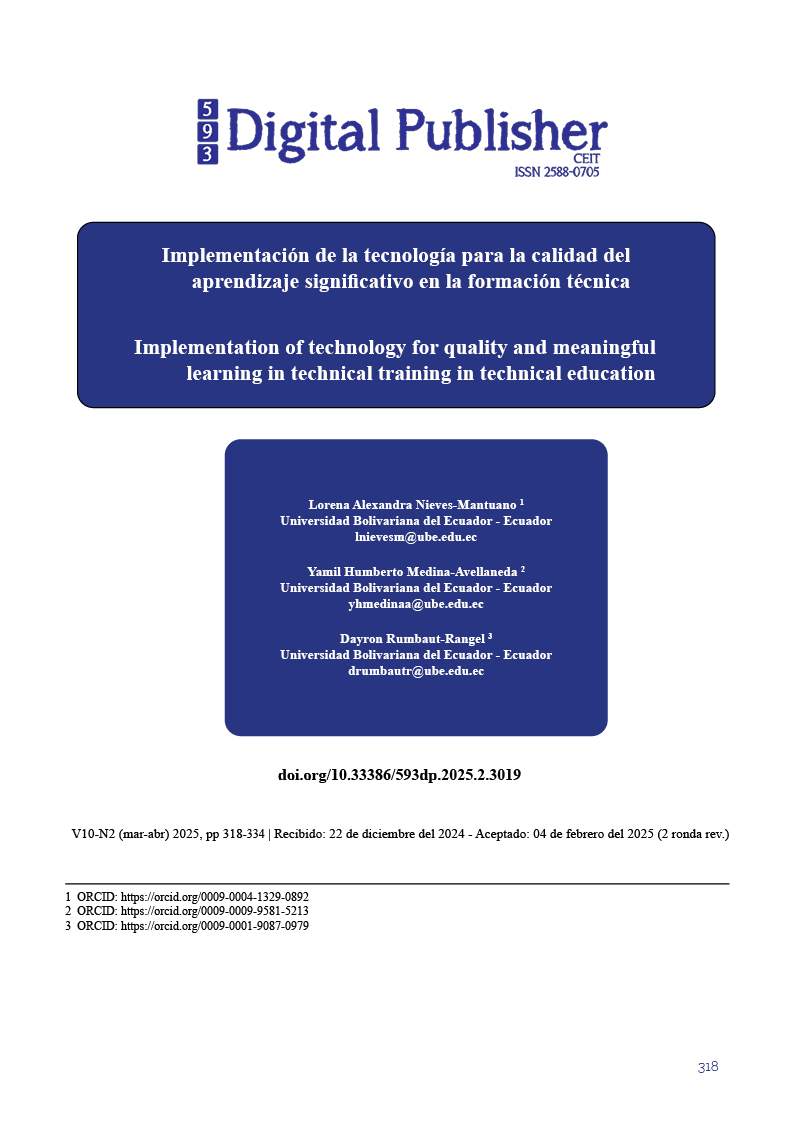Implementation of technology for quality and meaningful learning in technical training in technical education
Main Article Content
Abstract
This article aims to carry out a systematic review on aspects and components of greater support for business intelligence in education during the years 2020-2025 and for this purpose the search chain has been considered, obtaining 668 scientific articles referring to the subject, of which the inclusion and exclusion criteria have been applied, obtaining 25 articles to answer 4 research questions which would be focused on the main objectives, the tools and technologies, the dimensions of the business intelligence (BI) models, and the KPI measures and indicators that have been considered in the BI solution in education. BI solutions are crucial to improve decision making and optimize administrative and academic processes. The motivation of this review is to synthesize the existing literature, educational institutions can adopt best practices and improve their decision-making processes. The SR reveals that the implementation of BI in education allows institutions to significantly improve their operational efficiency and educational quality. In conclusion, the adoption of BI technologies and tools in the educational field is essential to face the challenges of data management and optimize educational processes, which improves administrative efficiency and academic performance.
Downloads
Article Details

This work is licensed under a Creative Commons Attribution-NonCommercial-ShareAlike 4.0 International License.
1. Derechos de autor
Las obras que se publican en 593 Digital Publisher CEIT están sujetas a los siguientes términos:
1.1. 593 Digital Publisher CEIT, conserva los derechos patrimoniales (copyright) de las obras publicadas, favorece y permite la reutilización de las mismas bajo la licencia Licencia Creative Commons 4.0 de Reconocimiento-NoComercial-CompartirIgual 4.0, por lo cual se pueden copiar, usar, difundir, transmitir y exponer públicamente, siempre que:
1.1.a. Se cite la autoría y fuente original de su publicación (revista, editorial, URL).
1.1.b. No se usen para fines comerciales u onerosos.
1.1.c. Se mencione la existencia y especificaciones de esta licencia de uso.
References
Cabero-Almenara, J., & Marín-Díaz, V. (2014). Las redes sociales en educación: desde la innovación a la investigación educativa. RIED. Revista Iberoamericana de Educación a Distancia, 17(1), 25-40. Recuperado de https://www.redalyc.org/journal/3314/331460297002/331460297002.pdf
Castillo, J., López, R., & Méndez, T. (2021). Transformación digital en la educación técnica: Retos y oportunidades. Revista Iberoamericana de Educación Técnica, 12(4), 55-68.
Fuentes, A., López, J., & Pozo, S. (2019). Análisis de la competencia digital docente: Factor clave en el desempeño de pedagogías activas con realidad aumentada. REICE. Revista Iberoamericana sobre Calidad, Eficacia y Cambio en Educación, 17(2), 27-42.
García, R. (2020). El aprendizaje activo como estrategia para mejorar la calidad educativa. Journal of Educational Innovation, 7(2), 15-28.
González, E. (2021). Tecnología educativa y personalización del aprendizaje. Journal of Pedagogical Studies, 10(3), 33-45.
González, M., & Hernández, F. (2022). Educación inclusiva y tecnología: Hacia una equidad en el aprendizaje técnico. Editorial Académica Latinoamericana.
González, P., & López, M. (2021). Tecnología y aprendizaje basado en problemas: Una propuesta innovadora. Revista de Innovación Educativa, 16(2), 43-56.
López, J., & Martínez, F. (2021). Tecnología y aprendizaje de calidad en la educación superior. Revista de Educación Digital, 9(1), 12-23.
Martínez, F., & López, P. (2022). La colaboración en el aprendizaje: Estrategias y herramientas digitales. Journal of Educational Technology, 9(1), 11-23.
Martínez, L. (2021). Tecnologías y aprendizaje activo: Un análisis de su impacto en la calidad educativa. Revista de Innovación Pedagógica, 10(1), 25-39.
Medina, P., & González, W. (2022). Las tecnologías en la educación: enfoque de ciencia y sociedad. Revista Cubana de Educación Superior, 41(2), 639-654. Recuperado de http://scielo.sld.cu/scielo.php?script=sci_arttext&pid=S2218-36202022000600639.
Medina, R., Vargas, L., & Torres, A. (2023). Formación docente y uso de recursos digitales: Buenas prácticas en la educación técnica. Revista de Ciencias Pedagógicas, 15(2), 29-45.
Morales, C., & Pérez, G. (2023). Competencias digitales en la formación profesional: Un estudio exploratorio. Universidad Nacional Autónoma de México.
Moreira, P. (2019). El aprendizaje significativo y su rol en el desarrollo social y cognitivo de los adolescentes. Rehuso, 4(2), 1-12. Recuperado de: https://revistas.utm.edu.ec/index.php/Rehuso/article/view/1845
Ortega, F., & León, P. (2023). Cerrando la brecha digital: Estrategias inclusivas en educación técnica. Revista Latinoamericana de Educación Inclusiva, 10(2), 75-88.
Pérez, A. (2022). El papel del docente en la mejora de la calidad educativa. Revista de Investigación en Educación, 8(2), 15-28.
Ramos, E., & Peredo M. (2023). El papel de la tecnología para la mejora de la calidad educativa. Rehuso, 4(2), 1-12. Recuperado de: https://doi.org/10.37811/cl_rcm.v7i3.6245
Rodríguez, M. (2021). Evaluación integral y calidad educativa. Revista de Psicopedagogía, 5(2), 33-45.
Rodríguez, P., & Vargas, T. (2021). Infraestructura tecnológica y su impacto en la formación técnica: Un enfoque práctico. Revista Internacional de Educación y Tecnología, 9(5), 67-80.
Salazar, D., & García, F. (2021). Factores determinantes de la calidad del aprendizaje en educación superior. Journal of Educational Research, 11(4), 42-56.
Selwyn, N. (2014). Education in a digital world: global perspectives on technology and education. RIED. Revista Iberoamericana de Educación a Distancia, 17(1), 185-188. Recuperado de https://dialnet.unirioja.es/servlet/articulo?codigo=5144570
Serrano, A., & González, M. (2020). El aprendizaje activo y el uso de tecnologías en la educación superior. Revista Iberoamericana de Educación, 8(4), 45-59.
Torres, J., & Ramírez, S. (2022). Adaptación pedagógica frente a la tecnología: Innovaciones en la enseñanza técnica. Revista de Educación Avanzada, 11(6), 50-72.
Vargas, G., I. (2020). Estrategias educativas y tecnología digital en el proceso de enseñanza-aprendizaje. Revista de Investigación Educativa, 37(2), 451-468. Recuperado de http://www.scielo.org.bo/scielo.php?script=sci_arttext&pid=S1652-67762020000100010
Vázquez, J. (2021). Evaluación formativa y su impacto en la calidad del aprendizaje. Revista de Investigación Educativa, 14(2), 19-32.




